2018年6月广西学业考试英语真题和参考答案
2018年6月大学英语三级(A级)真题试卷(题后含答案及解析)
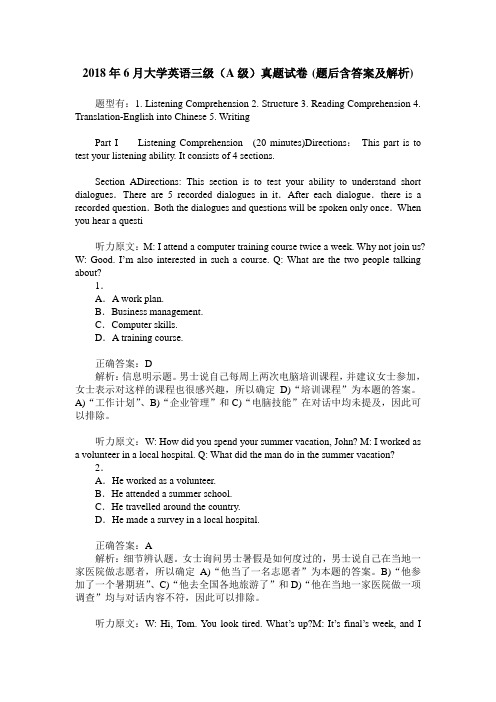
2018年6月大学英语三级(A级)真题试卷(题后含答案及解析)题型有:1. Listening Comprehension 2. Structure 3. Reading Comprehension 4. Translation-English into Chinese 5. WritingPart I Listening Comprehension (20 minutes)Directions:This part is to test your listening ability. It consists of 4 sections.Section ADirections: This section is to test your ability to understand short dialogues.There are 5 recorded dialogues in it.After each dialogue.there is a recorded question.Both the dialogues and questions will be spoken only once.When you hear a questi听力原文:M: I attend a computer training course twice a week. Why not join us? W: Good. I’m also interested in such a course. Q: What are the two people talking about?1.A.A work plan.B.Business management.C.Computer skills.D.A training course.正确答案:D解析:信息明示题。
男士说自己每周上两次电脑培训课程,并建议女士参加,女士表示对这样的课程也很感兴趣,所以确定D)“培训课程”为本题的答案。
【月考试卷】广西梧州柳州2018届高三毕业班摸底调研考试英语试题Word版含答案
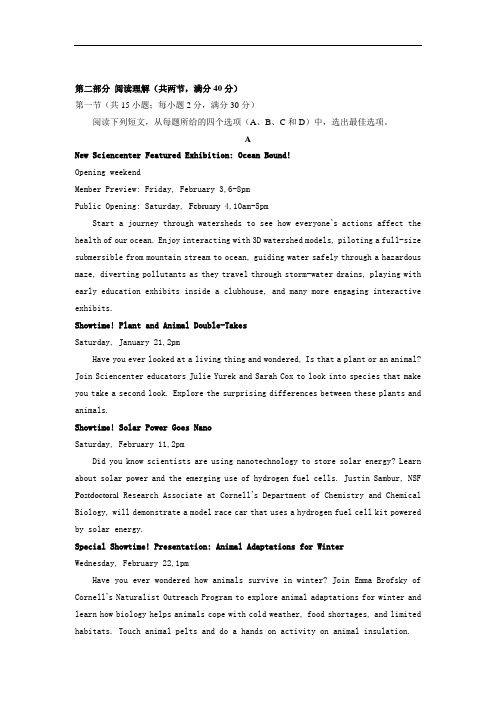
第二部分阅读理解(共两节,满分40分)第一节(共15小题;每小题2分,满分30分)阅读下列短文,从每题所给的四个选项(A、B、C和D)中,选出最佳选项。
ANew Sciencenter Featured Exhibition: Ocean Bound!Opening weekendMember Preview: Friday, February 3,6-8pmPublic Opening: Saturday, February 4,10am-5pmStart a journey through watersheds to see how everyone‟s actions affect the health of our ocean. Enjoy interacting with 3D watershed models, piloting a full-size submersible from mountain stream to ocean, guiding water safely through a hazardous maze, diverting pollutants as they travel through storm-water drains, playing with early education exhibits inside a clubhouse, and many more engaging interactive exhibits.Showtime! Plant and Animal Double-TakesSaturday, January 21,2pmHave you ever looked at a living thing and wondered, Is that a plant or an animal? Join Sciencenter educators Julie Yurek and Sarah Cox to look into species that make you take a second look. Explore the surprising differences between these plants and animals.Showtime! Solar Power Goes NanoSaturday, February 11,2pmDid you know scientists are using nanotechnology to store solar energy? Learn about solar power and the emerging use of hydrogen fuel cells. Justin Sambur, NSF Postdoctoral Research Associate at Cornell‟s Department of Chemistry and Chemical Biology, will demonstrate a model race car that uses a hydrogen fuel cell kit powered by solar energy.Special Showtime! Presentation: Animal Adaptations for WinterWednesday, February 22,1pmHave you ever wondered how animals survive in winter? Join Emma Brofsky of Cornell‟s Naturalist Outreach Program to explore animal adaptations for winter and learn how biology helps animals cope with cold weather, food shortages, and limited habitats. Touch animal pelts and do a hands on activity on animal insulation.21.What does Ocean Bound focus on?A. How people pollute the oceanB. How harmful a maze is sometimesC. How many pollutants the ocean hasD. How water flows from mountains to oceans22.When can you learn about ocean species?A. Friday, February 3,6-8pmB. Saturday, January 21,2pmC. Saturday, February 11,2pmD. Wednesday, February 22,1pm23.Who will introduce the ability of animals‟ survival?A. Julie YurekB. Sarah CoxC. Justin SamburD. Emma BrofskyBEveryone smiles in the same language. But not everyone smiles in the same medium, and that might be hurting us.That‟s according to a new study from researches at the University of Haifa and Ben-Gurion University, both in Israel, and the University of Amsterdam in the Netherlands. Inadvertently timed to the recent release of “The Emoji Movie,”scientists decided to study whether using smile emojis in text messages between work colleagues caused the same warm feelings as a face-to-face interaction that includes a smile.The results? For the first time, science was able to confirm that a smile emoji does not conjure those same feelings. Quite the opposite, in face: using a smile emoji in conversation actually decreases perception of the colleague‟s competence and inserts a level of distance into the relationship.It‟s a phenomenon study leader Arik Cheshin dubbed “virtual first-impression management.” He and his colleagues, including co-leader Ella Glikson, conducted several experiments analyzing the reactions to text messages that included smile emojis versus messages that don‟t. They also measured these same interactions in social settings and found that the emojis actually improved perception.“I believe there is a greater gap in what the sender is hoping to convey and what the receiver interprets,”Cheshin, a professor, said, “This intention-interpretation gap can be damaging.”In addition, Cheshin and colleagues found that the effects of smiley use on social perceptions occur regardless of the expresser‟s perceived gender.So what‟s the takeaway here “I don‟t think that emoticons and emojis replace actual emotion.” Cheshin told us. “They are just different. The emotions are there and will always be when there are humans involved.”Before picking an emoji that fits your mood at the moment, it‟s better to just use words at least when you‟re at work. Or, better yet, just show up and talk face-to-face. You know, like the good old days.24.What is found in the study by Arik?A. Work colleagues use smile emojis moreB. A smile emoji leads to warm feelingsC. Smile emojis keep colleagues at a distanceD. Smiley use works better than face-to-face interaction25.According to Cheshin, the emojis senders may not know .A. how much virtual impression it leavesB. how it changes social settingsC. how it has improved perceptionD. how the receiver will understand it26.What is the writer‟s attitude towards emojis at work?A. CautiousB. PositiveC. DisapprovingD. Indifferent27.What is the best title for the text?A. Words mean much more than your smile emojisB. Your smile emojis won‟t replace your actual smileC. Smiling is a universal language in any communicationD. Misunderstanding may arise from smile emojisCReyna Gordon was an aspiring opera singer fresh out of college when she began considering the questions that would eventually define her career.“I moved to Italy when I finished my bachelor of music, and I started to take more linguistic classes and to think about language in the brain, and music in the brain,”she says. “What was happening in our brains when we were listening to music, when we were singing? What was happening in my brain when I was singing?”Today, Gordon studies how rhythm and music training might help children withatypical language development.“One thing that rhythm and grammar have in common is that they both unfold over time, and our brains form expectancies about what‟s coming up based on what we just heard,” says Gordon.Consider the following sentence: The boy read the book that his mother gave to him. “When we hear …The boy read,‟then we‟re expecting an object after that,”Gordon says. “Then when we hear ‟The boy read the book? that we‟re expecting an additional clause-something else about the book.‟”By age 5, Gordon says children typically understand and use complex sentences. But studies have shown that about 7 percent of children have what‟s known as developmental language disorder, which prevents their language skills even though they have IQs in the normal range and don‟t have autism or hearing impairment. Gordon says. “So expressing complex ideas, especially as they start to go through school, is difficult.”Gordon studies children with and without language impairment in a training program called MILEStone, which involves weekly Suzuki violin lessons and a weekly movement class.“There may be something that music training can do to help boost things. Maybe we‟re able to boost their auditory processing skills in the brain, or something about their rhythm sensitivity in their everyday listening to language,”Gordon says. “We don‟t know yet, so we actually have a whole series of questions to look at.”28.What did the questions that Reyna considered reflect?A. Her trouble as an opera singerB. Her interest in music classesC. Her puzzlement at the role of brainD. Her curiosity about language and music29.How does Gordon find children with good rhythm skills?A. They have a good grasp of grammarB. They are easy to have good expectationsC. They expect their brain to form good expectationsD. They tend to read books on grammar30.What do children with developmental language disorder have?A. Poor IQ at their young agesB. Difficulty expressing complex ideasC. A serious hearing impairmentD. Clear autistic behaviors in life31.How was the role of MILEStone according to the last paragraph?A. PracticalB. DoubtfulC. DecisiveD. UnclearDMachines might one day replace human laborers in a number of professions, but surely they won‟t ever replace human artists. Right?Think again.Not even our artists will be safe from the inevitable machine takeover,if a new development in artificial intelligence by a team of researchers from Rutgers University and Facebook's b offers a clue of what's to come.They have designed an A.I.capable of not only producing art,but actually inventing whole new aesthetic styles similar to movements like impressionism or abstract expressionism,reports.The idea,according to researcher Marian Mazzone,was to make art that is "novel,but not too novel."The model used in this project involved a generator network,which produces the images,and a discriminator network,which "judges" whether it's art.Once the generator learns how to produce work that the distributor recognizes as art,it's given an additional directive: to produce art that doesn't match any known aesthetic styles."You want to have something really creative and striking-but at the same time not go too far and make something that isn't aesthetically(美学地) pleasing," explained Ahmed Elgammal.The art that was generated by the system was then presented to human judges alongside human-produced art without showing which was which.To the researchers' surprise,the machine-made art scored slightly higher overall than the human-produced art.Of course,machines can't yet replace the meaning that's infused in works by human artists, but this project shows that artist skill sets certainly seem duplicatable by machines.What will it take for machines to produce content that's infused with meaning?That might be the last A.I. frontier.Human artists can at least hang their hats in that field...for now."Imagine having people over for a dinner party and they ask,…Who is that by?‟And you say,…Well,it's a machine actually‟.That would be an interesting conversation starter,"said Kevin Walker.32.What is implied in the first paragraph?A.Artists won't be replaced by AIB.AI can produce new styles of artC.AI is totally at a loss about impressionismD.AI fails to reflect abstract expressionism33.What did Marian find in his study?A.AI can copy the skills of artistsB.AI can combine content with meaningC.AI can make art aesthetically unpleasantD.AI can please human judges with its art34.What does the underlined phrase “hang their hats” mean?A.DiscoverB.HoldC.StruggleD. Survive35.What Kevin said in the last paragraph tells us that.A.she uses machines to cook for a partyB.she likes to join in a dinner partyC.she expects the arrival of AID.she cares about the starter of a chat第二节(共5小题;每小题2分,满分10分)根据短文内容,从短文后的选项中选出能填入空白处的最佳选项。
2018年广西玉林市中考英语试卷(含解析)
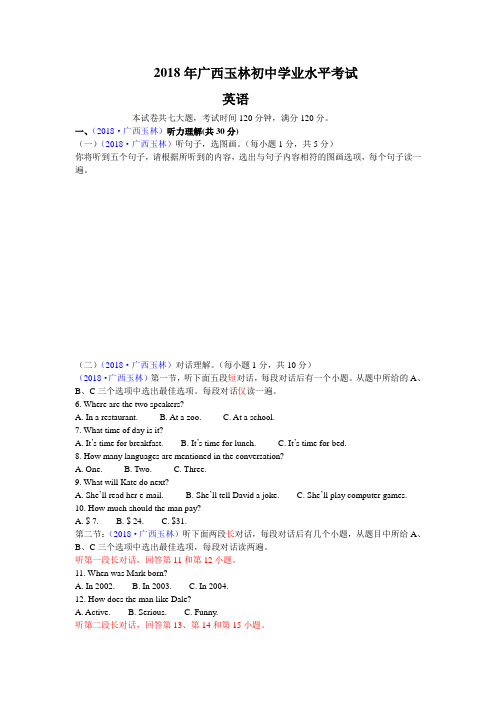
2018年广西玉林初中学业水平考试英语本试卷共七大题,考试时间120分钟,满分120分。
一、(2018·广西玉林)听力理解(共30分)(一)(2018·广西玉林)听句子,选图画。
(每小题1分,共5分)你将听到五个句子,请根据所听到的内容,选出与句子内容相符的图画选项,每个句子读一遍。
(二)(2018·广西玉林)对话理解。
(每小题1分,共10分)(2018·广西玉林)第一节,听下面五段短对话,每段对话后有一个小题。
从题中所给的A、B、C三个选项中选出最佳选项。
每段对话仅读一遍。
6. Where are the two speakers?A. In a restaurant.B. At a zoo.C. At a school.7. What time of day is it?A. It’s time for breakfast.B. It’s time for lunch.C. It’s time for bed.8. How many languages are mentioned in the conversation?A. One.B. Two.C. Three.9. What will Kate do next?A. She’ll read her e-mail.B. She’ll tell David a joke.C. She’ll play computer games.10. How much should the man pay?A. $ 7.B. $ 24.C. $31.第二节:(2018·广西玉林)听下面两段长对话,每段对话后有几个小题,从题目中所给A、B、C三个选项中选出最佳选项,每段对话读两遍。
听第一段长对话,回答第11和第12小题。
11. When was Mark born?A. In 2002.B. In 2003.C. In 2004.12. How does the man like Dale?A. Active.B. Serious.C. Funny.听第二段长对话,回答第13、第14和第15小题。
18年年英语真题及解析_2018年广西高考英语试卷

2018年广西高考英语试卷第一部分听力(共两节,满分7.5分)做题时,先将答案标在试卷上,录音结束后,你将有两分钟的时间将试卷上的答案转涂到答题卡上。
第一节(共5小题,每小题1.5分,满分7.5分)听下面5段对话,每段对话后有一个小题,从题中给的A、B、C三个选项中选出最佳答案。
听完每段对话后,你都有10秒钟的时间来回答有关小题和阅读下一小题。
每段对话仅读一遍。
例:How much is the shirt?A.£19.15.B.£9.18.C.£9.15.答案是C。
1.(1.50分)What does John find difficult in learning German?A.Pronunciation.B.Vocabulary.C.Grammar.2.(1.50分)What is the probablerrelationship between the speakers?A.Colleagues.B.Brother and sister.C.Teacher and student.3.(1.50分)Where does the conversation probably take place?A.In a bank.B.At a ticket office.C.On a train.4.(1.50分)What are the speakers talking about?A.A restaurant.B.A street.C.A dish.5.(1.50分)What does the woman think of her interview?A.It was tough.B.It was interesting.C.It was successful.第二节(共5小题;每小题1.5分,满分22.5分)听下面5段对话或独白。
每段对话或独白后有几个小题,从题中给的A、B、C三个选项中选出最佳选项。
广西北部湾2018年中考英语试题(word版,含解析)听力原文音频MP3

2018年广西北部湾经济区初中学业水平统一考试英语试题(考试时间120 分钟,满分120 分)注意事项:1. 试卷分为试题卷和答题卡两部分,答案一律填写在答题卡上,在试题卷上作答无效.2. 答题前,请认真阅读答题卡上的注意事项。
3. 考试结束后,将本试题卷和答题卡一并交回。
第Ⅰ卷(共90 分)一、听力测试(共30 小题,每小题1分,共30 分)(一) 听句子,选图片。
(共5小题,每小题1分,共3分) 你将听到五个句子,请在下列六幅图中,选出与所听句子内容相符的图片,并在答题卡上将选定答案的字母标号涂黑。
每个句子读一遍。
1.2.3.4.5.(二)听句子,选答语。
(共5小题,每小题1分,共5分)你将听到五个句子,请根据句子内容,选择恰当的答语,并在答题卡上将选定答案的字母标号涂黑。
每个句子读两遍。
1.A. Beijing duck. B. Orange juice. C. Ice cream.2.A. I'm fine, thanks. B. I'm thirteen. C. I'm tall.3.A. Good idea. B. Never mind. C. Y ou're welcome.4.A. Don't mention it. B. Not at all. C. Thank you.5. A Two days ago. B. For a month. C. Twice a week.(三)听对话,选择最佳答案。
(共10 小题,每小题1分,共10 分)你将听到三段对话,请根据对话内容,选出每个问题的最佳答案,并在答题卡上将选定答案的字母标号涂黑。
每段对话读两遍。
请听第一段对话,回答第11-13 小题。
6.Where does Lily go with her dad?A.To their old house.B. To their new hose.C. To her school.7.Which room is big?A.The kitchen.B. The living room.C. The bedroom.8.What colour does Lily like best?A.Pink.B. Y ellow.C. Blue.请听第二段对话,回答第14-16 小题。
2018年6月英语六级考试真题及答案(第3套)

2018年6月英语六级考试真题试卷附答案(完整版第3套)Part I Writing (30minutes)Directions: For this part, you are allowed 30minutes to write an essay on the importance ofbuilding trust between businesses and consumers. You can cite examples to illustrate yourviews. You should write at least 150 words but n o more than 200 words.______________________________________________________________ ________________________________________________________________________ ________________________________________________________________________ __________Part II Listening Comprehension (30minutes)说明:由于2018年6月六级考试全国共考了两套听力,本套真题听力与前2套内容相同,只是选项顺序不同,因此在本套真题中不再重复出现。
Part III Reading Comprehension (40minutes)Section ADirections: In this section, there is a passage withten blanks. You are require d to select one word foreach blank from a list of choices given in a word bank following the passage. Read thepassage through carefully before making your choices. Each choice in the bank is identified by a letter. Please mark the cor responding letter for each item on Answer Sheet 2 with asingle line through t he centre. You may not use any of the words in the bank more than once. When Elon Musk says that his new priority is using artificial intelligence to build domestic robots, we should look forward to the day in admiration. Mr. Musk is a guy who gets things done. The founder of two tech companies, Tesla Motors andSpaceX, is bringing electric vehicles to mass market and __ _26___ humans to live on otherplanets. This sounds like so much hot air, but the near $13 billion fortune this entrepreneur has ___27___ comes from practical achievements rather than hypothetical ones.A lot of clever people are ___28___ about artificial intelligence, fearing tha t robots will oneday become so ___29___ that they'll murder all of us. These fears are mostly ___30___: aswith hysteria about genetic modification, w e humans are generally wise enough tomanage these problems with speed an d care.And just think of how wonderful it would be if you had a live-in robot. It could, ___31___, belike having a babysitter and a nurse rolled into one—or, if that r equired ___32___intelligence beyond the power of Mr. Musk's imagined ma chine, at least someone to chopthe carrots, wash the car and mow the lawn. Once purchased and trained, this would allowthe ___33___ user to save mon ey and time, freeing up ___34___ space in our busy lives toread a good book. That is why we welcome Mr. Musk's latest ___35___, and wish him well. As lo ng as robotsadd to the sum of human happiness, reduce suffering, and create time to read world-classjournalism, we should be their fans. Especially since j ournalism is one job robots will neverdo.A) amassed B) casual C) emotional D enabling E) eventually F) exaggerat ed G)extravagant H) generously I) misleading J) precious K) reward L) s mart M) sphere N)terrified O) ventureSection BDirections: In this section, you are going to read a passage with ten statemen ts attached toit. Each statement contains information given in one of the par agraphs. Identify theparagraph from which the information is derived. You ma y choose a paragraph more thanonce. Each paragraph is marked with a letter. Answer the questions by marking thecorresponding letter on Answer Sheet 2.In the real world, nobody cares that you went to an Ivy League schoolA) As a high school junior, everything in my life revolved around getting into t he right college.I diligently attended my SAT, ACT, and Advanced Placement test preparation courses. Ijuggled (尽力应付) cross-country and track schedules, newspaper staff, and my church's you thgroup and drama team. I didn't drink, party, or even do much dating. The ri ght college, Ithought, was one with prestige, one with a name. It didn't have to be the Ivy League, but itneeded to be a "top school."B) Looking back now, nine years later, I can't remember exactly what it was a bout theseuniversities that made them seem so much better. Was it a curriculum that appeared more rigorous, perhaps? Or an alumni network that I h oped would open doors down the line?Maybe."I do think there are advantages to schools with more recognition," notes M arybethGasman, a professor of higher education at the University of Pennsylv ania. "I don'tnecessarily think that's a reason to go to one."C) In reflection, my firm belief in the power of the brand was naive, not to mention a bitsnobby. I quickly passed over state schools and southern school s, believing their curriculumsto be automatically inferior to northeastern or western counterparts. Instead, I dreamed ofliving in New York City and my p arents obliged me with a visit to New York University's (NYU)campus. During the tour, tuition fees were discussed.(NYU is consistently ranked one of thecountry's most expensive schools, wit h room and board costs totaling upwards of $ 64,000 ayear.) Up until then, I hadn't truly realized just how expensive an education can be. Over thenext fe w months, I realized not only could I not afford my dream school, I couldn't e venafford the ones where I'd been accepted. City University of New York (CU NY), RutgersUniversity, and Indiana University were out of reach as were Miss issippi State and theUniversity of Alabama, where I would have to pay out-of-state fees. Further complicating mycollege search was a flourishing track car eer—I wanted to keep running but my timesweren't quite fast enough to sec ure a scholarship.D) And so, at 11 pm on the night of Georgia State University's (GSU) midnigh t deadline, Iapplied online. Rated No.466 overall on Forbes' Lists Top Colleges, No.183 in ResearchUniversities, and No.108 in the South, I can't say it was my top choice. Still, the trackcoach had offered me a walk-on spot, and I actually found the urban Atlanta campus a d ecent consolation prize after New York City.E) While it may have been practical, it wasn't prestigious. But here's the thi ng: I loved my"lower-tier" (低层次的) university.(I use the term "low-tier" cautiously, because GSU is a well-regarded researc h institution that attracts high quality professors and faculty from all overth e country.) We are taught to believe that only by going to the best schools an d getting thebest grades can we escape the rat race and build a better future . But what if lower-tiercolleges and universities were the ticket to escaping th e rat race? After all, where else canyou leave school with a decent degree—but without a lifetime of debt?F) My school didn't come prepackaged like the more popular options, so we were left to takecare of ourselves, figuring out city life and trying to complete degree programs that no onewas championing for us to succeed in. What I'm saying is, I loved my university because ittaught us all to be resourceful and we could make what we wanted out of it.G) I was lucky enough to have my tuition covered by a lottery-funded schola rship calledHOPE (Helping Outstanding Pupils Educationally). When I started c ollege, the HOPEscholarship was funded by the state of Georgia and offered t o graduating high school seniorswith a GPA of 3.0 or higher. Living costs and books I paid for with money earned during highschool, supplemented by a sm all college fund my deceased grandfather left for me and a modest savings ac count my parents created when I was born.H) So what about all that name recognition? Sure, many of my colleagues a nd competitorshave more glamorous alma maters (母校) than I do. As a journalist, I have competed againstNYU, Columbia, and No rtheastern graduates for jobs. And yet, not a single interviewer hasever asked me about my educational background. In fact, almost every interview I've e verhad was due to a connection—one that I've gained through pure determi nation, not a school brand.I) According to The Boston Globe, students who earned their bachelor's in 2012 have anaverage monthly loan payment of $312, which is one-third more than those who graduatedin 2004. Ultimately, that's the thing universities do n't want to admit. Private universities aremoney-making institutions. If you ca n afford to buy prestige, that's your choice. For the restof us, however, our h earty lower-tiered universities are just fine, thank you.J) Wealthy universities talk up the benefits their name will give graduates: na mely, strongalumni networks, star faculty, and a résuméboost. But you nee dn't attend an Ivy Leagueschool to reap those rewards. Ludacris and the for mer CEO of Bank of America Ken Lewis arealumni of my college, as well as VI CE's first female editor-in-chief, Ellis Jones. Successfulpeople tend to be succ essful no matter where they go to school, and lower-tier schools canhave alu mni networks just as strong as their big name counterparts. In fact, lower-tie r schoolalumni networks are arguably stronger, because fellow alumni recog nize that you didn'tnecessarily have an easy path to follow. They might be m ore willing to offer career help,because your less famous school denotes that, like them, you are also full of energy and perseverance.K) The Washington Post reported on a recent study by Princeton economists, i n which collegegraduates who applied to the most selective schools in the 12 th grade were compared tothose who applied to slightly less selective schoo ls. They found that students with more potential earned more as adults, and the reverse held true as well, no matter where theywent to school.L) Likewise, star faculty are not always found where you'd expect. Big name s chools are notnecessarily the best places for professors; plus, many professor s split teaching time between multiple colleges and/or universities. This mea ns, for instance, a CUNY student couldreasonably expect to receive the same quality of instruction from a prestigious professoras they would if they we re enrolled in the same class at NYU.M) It's possible that some hiring managers may be drawn to candidates with a particular educational résumé, but it's no guarantee. According to a 2012 survey described in TheAtlantic, college reputation ranked lowest in relative importance of attributes in evaluatinggraduates for hire, beaten out by top fa ctors like internships, employment during college,college major, volunteer ex perience, and extracurriculars.N) Maybe students who choose less prestigious universities are bound to suc ceed becausethey are determined to. I tend to think so. In any case, if I co uld do it again, I'd still makethe same choice. Today I'm debt-free, resourcef ul—and I understand that even theshiniest packaging can't predict what yo u'll find on the inside.36. Modest institutions can also have successful graduates and strong alumni networks.37. The money the author made in high school helped pay for her living expe nses and booksat college.38. The author came to see how costly college education could be when she was trying tochoose a university to attend.39. A recent study found that a graduate's salary is determined by their pot ential, not theuniversity they attended.40. The author cannot recall for sure what made certain top universities app ear a lot better.41. None of the author's job interviewers cared which college she went to.42. The author thinks she did the right thing in choosing a less prestigious u niversity.43. In order to be admitted to a prestigious university, the author took part in various extracurricular activities and attended test preparation courses. 44. The author liked her university which was not prestigious but less expen sive.45. Colleges are reluctant to admit that graduates today are in heavier debt.Section CDirections: There are 2 passages in this section. Each passage is followed by s ome questionsor unfinished statements. For each of them there are four cho ices marked A), B), C) andD). You should decide on the best choice and mark the corresponding letter on Answer Sheet2 with a single line through the cen tre.Passage OneQuestions 46 to 50 are based on the following passage.Economically speaking, are we better off than we were ten years ago? Twenty years ago?In their thirst for evidence on this issue, commentators seized on the recent report by theCensus Bureau, which found that average household income ros e by 5.2% in 2015.Unfortunately, that conclusion puts too much weight on a useful, but flawed and incomplete, statistic. Among the more significant pro blems with the Census's measure arethat:1) it excludes taxes, transfers, and compensation like employer-provided he alth insurance; and 2) it is based on surveys rather than data. Even if precise ly measured,income data exclude important determinants of economic well-being, such as the hours ofwork needed to earn that income.While thinking about the question, we came across a recently published articl e by CharlesJones and Peter Klenow, which proposes an interesting new mea sure of economic welfare.While by no means perfect, it is considerably more comprehensive than average income,taking into account not only growth in consumption per person but also changes in workingtime, life expectancy, an d inequality. Moreover, it can be used to assess economic performance bot h across countries and over time.The Jones-Klenow method can be illustrated by a cross-country example. Su ppose we wantto compare the economic welfare of citizens of the U.S. and Fr ance in 2005.In 2005, as the authors observe: real consumption per person in France was only 60% ashigh as the U.S., making it appear that Americans were economi cally much better off thanthe French on average. However, that comparison omits other relevant factors: leisuretime, life expectancy, and economic ine quality. The French take longer vacations and retireearlier, so typically work fewer hours; they enjoy a higher life expectancy, presumablyreflecting advant ages with respect to health care, diet, lifestyle, and the like; and income andc onsumption are somewhat more equally distributed there than in the U.S. Bec ause of thesedifferences, comparing France's consumption with the U.S.'s ove rstates the gap in economicwelfare.Similar calculations can be used to compare the U.S. and other countries. For example, this calculation puts economic welfare in the United Kingdom at 97 % of U.S. levels, butestimates Mexican well-being at 22%.The Jones-Klenow measure can also assess an economy's performance ov er time.According to this measure, as of the early-to-mid-2000s, the U.S. ha d the highest economicwelfare of any large country. Since 2007, economic we lfare in the U.S. has continued toimprove. However, the pace of improveme nt has slowed markedly.Methodologically, the lesson from the Jones-Klenow research is that economic welfare ismulti-dimensional. Their approach is flexible enough that in pri nciple other important quality-of-life changes could be incorporated-for exa mple, decreases in total emissions ofpollutants and declines in crime rates.46. What does the author think of the 2015 report by the Census Bureau?A) It is based on questionable statistics.B) It reflects the economic changes.C) It evidences the improved-welfare.D) It provides much food for thought.47. What does the author say about the Jones-Klenow method?A) It is widely used to compare the economic growth across countries.B) It revolutionizes the way of measuring ordinary people's livelihood.C) It focuses on people's consumption rather than their average income.D) It is a more comprehensive measure of people's economic well-being.48. What do Jones and Klenow think of the comparison between France and the U. S. interms of real consumption per person?A) It reflected the existing big gap between the two economies.B) It neglected many important indicators of people's welfare.C) It covered up the differences between individual citizens.D) It failed to count in their difference in natural resources.49. What is an advantage of the Jones-Klenow method?A) It can accurately pinpoint a country's current economic problems.B) It can help to raise people's awareness of their economic well-being.C) It can diagnose the causes of a country's slowing pace of economic impr ovement.D) It can compare a country's economic conditions between different periods of time.50) What can we infer from the passage about American people's economic well-being?A) It is much better than that of their European counterparts.B) It has been on the decline ever since the turn of the century.C) It has not improved as much as reported by the Census Bureau.D) It has not been accurately assessed and reported since mid-2000s. Passage TwoQuestions 51 to 55 are based on the following passage.If you've ever started a sentence with,"If I were you..." or found yourself scratching yourhead at a colleague's agon y over a decision when the answer is crystal-clear, there's ascientific reason behind it. Our own decision-making abilities can become depleted over thec ourse of the day causing indecision or poor choices, but choosing on behalf of someone elseis an enjoyable task that doesn't suffer the same pitfalls. The problem is "decision fatigue," a psychological phenomenon that take s a toll on the quality of your choices after a long day of decision making, sa ys Evan Polman, a leading psychologist.Physicians who have been on the job for several hours, for example, are more likely to prescribe antibiotics to patients when it's unwise to do so. "Presumably it's because it'ssimple and easy to write a prescription and con sider a patient case closed rather than investigate further," Polman says. But decision fatigue goes away when you are making the decision for som eone else.When people imagine themselves as advisers and imagine their ow n choices as belonging tosomeone else, they feel less tired and rely less on d ecision shortcuts to make those choices."By taking upon the role of adviser rather than decision maker, one does notsuffer theconsequences of decision fatigue," he says."It's as if there's something fun and liberatingabout making someone else's c hoice."Getting input from others not only offers a fresh perspective and thought pr ocess; it oftenalso includes riskier choices. While this sounds undesirable, it c an be quite good, says Polman."When people experience decision fatigue-when they are tired of making ch oices—theyhave a tendency to choose to go with the status quo (现状)," he says."But the status quocan be problematic, since a change in the course of acti on can sometimes be important andlead to a positive outcome."In order to achieve a successful outcome or reward, some level of risk is al most always essential."People who are susceptible to decision fatigue will likely choose to do not hingover something," he says,"That's not to say that risk is always good, but it is related totaking action9w hereas decision fatigue assuredly leads to inaction and the possible chagri n(懊恼) of a decision maker who might otherwise prefer a new course but is unfo rtunatelyhindered."Just because you can make good choices for others doesn't mean you'll do th e same foryourself, Polman cautions."Research has found that women negotiate higher salaries forothers than the y do for themselves," he says, adding that people slip in and out of decision roles.51. What does the author say about people making decisions?A) They may become exhausted by making too many decisions for themselve s.B) They are more cautious in making decisions for others than for themselve s.C) They tend to make decisions the way they think advantageous to them.D) They show considerable differences in their decision-making abilities.52. What does the example about the physicians illustrate?A) Patients seldom receive due care towards the end of the day.B) Prescription of antibiotics can be harmful to patients' health.C) Decision fatigue may prevent people making wise decisions.D) Medical doctors are especially susceptible to decision fatigue.53. When do people feel less decision fatigue?A) When they take decision shortcuts.B) When they help others to make decisions.C) When they have major decisions to make.D) When they have advisers to turn to.54. What are people likely to do when decision fatigue sets in?A) They turn to physicians for advice.B) They tend to make risky decisions.C) They adopt a totally new perspective.D) They refrain from trying anything new.55. What does the passage say about taking some risk in decision making?A) It is vital for one to reach the goal desired.B) It is likely to entail serious consequences.C) It will enable people to be more creative.D) It will more often than not end in regret.Part IV Translation (30minutes)Directions: For this part, you are allowed 30minutes to translate a passage fr om Chinese intoEnglish. You should write your answer on AnswerSheet 2.自行车曾经是中国城乡最主要的交通工具,中国一度被称为“自行车王国”。
2018年广西高中学业水平考试英语试题
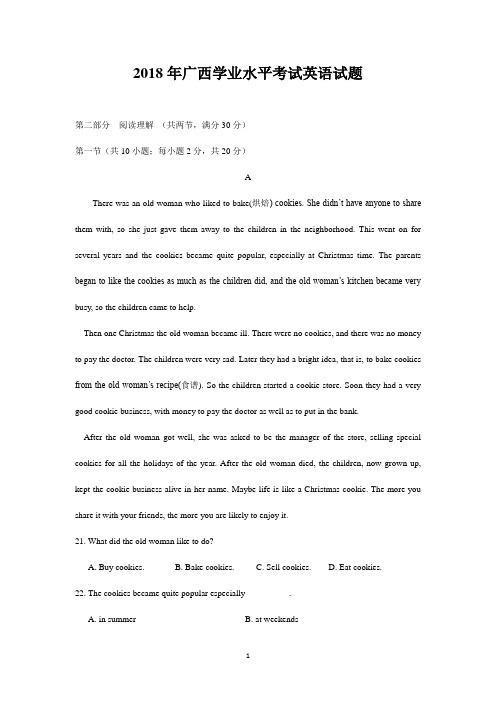
2018年广西学业水平考试英语试题第二部分阅读理解(共两节,满分30分)第一节(共10小题;每小题2分,共20分)AThere was an old woman who liked to bake(烘焙) cookies. She didn’t have anyone to share them with, so she just gave them away to the children in the neighborhood. This went on for several years and the cookies became quite popular, especially at Christmas time. The parents began to like the cookies as much as the children did, and the old woman’s kitchen became very busy, so the children came to help.Then one Christmas the old woman became ill. There were no cookies, and there was no money to pay the doctor. The children were very sad. Later they had a bright idea, that is, to bake cookies from the old woman’s recipe(食谱). So the children started a cookie store. Soon they had a very good cookie business, with money to pay the doctor as well as to put in the bank.After the old woman got well, she was asked to be the manager of the store, selling special cookies for all the holidays of the year. After the old woman died, the children, now grown up, kept the cookie business alive in her name. Maybe life is like a Christmas cookie. The more you share it with your friends, the more you are likely to enjoy it.21. What did the old woman like to do?A. Buy cookies.B. Bake cookies.C. Sell cookies.D. Eat cookies.22. The cookies became quite popular especially__________.A. in summerB. at weekendsC. at Christmas timeD. on Children’s Day23. The children came to help the old woman because_______.A. their parents wanted them to do soB. they wanted to start a cookie storeC. they didn’t like to go to schoolD. the old woman’s kitchen became very busy24. When the old woman was ill, the children ________.A. left her aloneB. baked cookies for her to eatC. took turns to look after herD. baked and sold the cookies to pay the doctor25. After the old woman got well, she was asked to ______.A. be the manager of the cookie storeB. give the cookies away to the poorC. share the cookies with othersD. sell the recipe of making cookiesBPeople are always afraid of making mistakes. But sometimes it’s not bad to make mistakes, and here is why.First of all, mistakes are a c lear sign that you are trying new things. It’s always good to try new things, because when you are trying new things you are growing. If you never try new things, how can you improve? How can you create? The simple answer is, “You can’t.” Look around you, everything you see is the result of someone trying new things.Another good thing about mistake is this: when you are making mistakes, you are learning. Consider this : Edison failed 10,000 times before he invented the light bulb. When he was askedhad learned 10,000 things that didn’t work.Finally, when you make a mistake, you are much closer to your goal. Why? Because youhave said what you should say, and you have done what you should do. Every time you make a mistake, you are closer to your goal. But it doesn’t mean that you can make mistakes without thinking. Instead, when you try new things you have to think them over so that you can keep away from some unnecessary mistakes.As the old saying goes, “ If you are not making mistakes, you are not trying hard enough.” So go bravely and make mistakes. And learn. And grow. And succeed.26.When you are trying new things, _______ .A. you are careful. B.you’re ki nd.C.You’re growing. D.you know nothing.27. After he failed 10,000 times, Edison ________ .A. gave up his experiment B.invented the light bulb.C. set up a new laboratory D.made 10,000 new things.28. The underline word “claimed” probably mea ns ________ .A. said B.shouted C.required D.cried29. How can you keep away from unnecessary mistakes?A.Correct them when you try new things.B.Do what you should do.C.Think them over when you try new things.D.Say what you should say.30. What’s the main idea of the passage?A. It’s not bad to make mistakes sometimes.B.When to correct mistakes.C.It’s not good to make mistake sometimes.D.How to correct mistakes.第二节(共5小题;每小题2分,满分10分)根据短文内容,从短文后的选项中选出能填入空白处的最佳选项。
2018年广西百色中考英语试卷 (含解析)
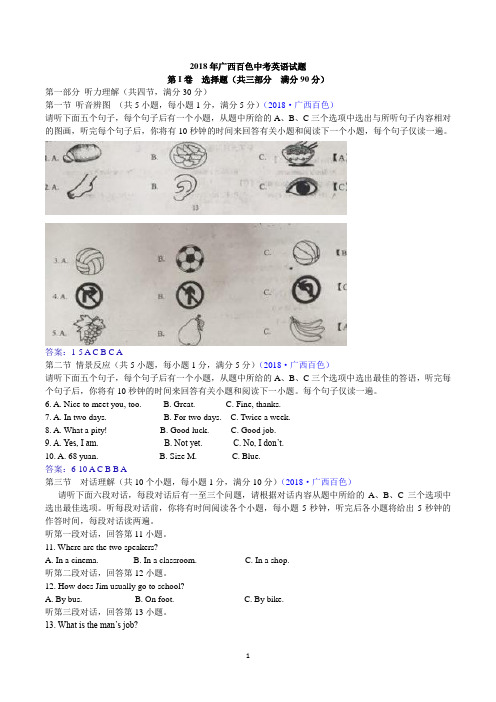
2018年广西百色中考英语试题第I卷选择题(共三部分满分90分)第一部分听力理解(共四节,满分30分)第一节听音辨图(共5小题,每小题1分,满分5分)(2018·广西百色)请听下面五个句子,每个句子后有一个小题,从题中所给的A、B、C三个选项中选出与所听句子内容相对的图画,听完每个句子后,你将有10秒钟的时间来回答有关小题和阅读下一个小题,每个句子仅读一遍。
答案:1-5 A C B C A第二节情景反应(共5小题,每小题1分,满分5分)(2018·广西百色)请听下面五个句子,每个句子后有一个小题,从题中所给的A、B、C三个选项中选出最佳的答语,听完每个句子后,你将有10秒钟的时间来回答有关小题和阅读下一小题。
每个句子仅读一遍。
6. A. Nice to meet you, too. B. Great. C. Fine, thanks.7. A. In two days. B. For two days. C. Twice a week.8. A. What a pity! B. Good luck. C. Good job.9. A. Yes, I am. B. Not yet. C. No, I don’t.10. A. 68 yuan. B. Size M. C. Blue.答案:6-10 A C B B A第三节对话理解(共10个小题,每小题1分,满分10分)(2018·广西百色)请听下面六段对话,每段对话后有一至三个问题,请根据对话内容从题中所给的A、B、C三个选项中选出最佳选项。
听每段对话前,你将有时间阅读各个小题,每小题5秒钟,听完后各小题将给出5秒钟的作答时间,每段对话读两遍。
听第一段对话,回答第11小题。
11. Where are the two speakers?A. In a cinema.B. In a classroom.C. In a shop.听第二段对话,回答第12小题。
广西壮族自治区普通高中2017-2018学年11月学业水平考试英语试题 Word版含答案
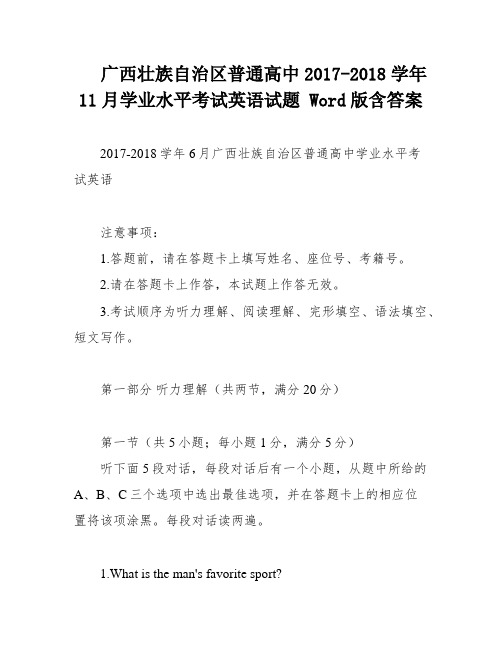
广西壮族自治区普通高中2017-2018学年11月学业水平考试英语试题 Word版含答案2017-2018学年6月广西壮族自治区普通高中学业水平考试英语注意事项:1.答题前,请在答题卡上填写姓名、座位号、考籍号。
2.请在答题卡上作答,本试题上作答无效。
3.考试顺序为听力理解、阅读理解、完形填空、语法填空、短文写作。
第一部分听力理解(共两节,满分20分)第一节(共5小题;每小题1分,满分5分)听下面5段对话,每段对话后有一个小题,从题中所给的A、B、C三个选项中选出最佳选项,并在答题卡上的相应位置将该项涂黑。
每段对话读两遍。
1.What is the man's favorite sport?A。
Basketball.B。
Swimming.C。
None of the above.2.What will the speakers do this weekend? A。
Have a ic.B。
Go shopping.C。
See a film.3.How will the woman get to Lake Street? A。
By ___.B。
On foot.___.4.What does the man want?A。
___.B。
Coffee.C。
Water.5.When does the n take place?A。
At 7:00.B。
At 8:00.C。
At 9:00.第二节(共15小题;每小题1分,满分15分)听下面5段对话或独白,每段对话或独白后有几个小题,从题中所给的A、B、C三个选项中选出最佳选项,并在答题卡上的相应位置将该项涂黑。
听每段对话或独白前,你将有时间阅读各小题,每小题5秒钟;听完后,各小题将给出5秒钟的作答时间。
每段对话或独白读两遍。
6.Where are the speakers?A。
In an office.B。
___.C。
In ___.7.How long did the woman wait?A。
【学考试卷】2018年6月广西壮族自治区普通高中学业水平考试英语真题和参考答案
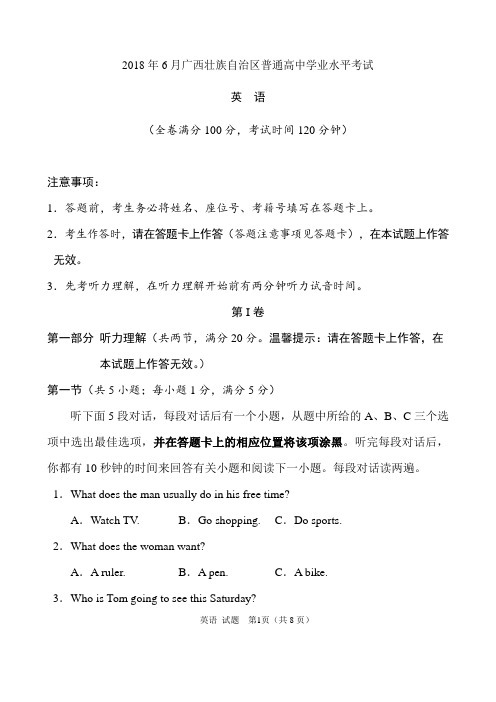
2018年6月广西壮族自治区普通高中学业水平考试英语(全卷满分100分,考试时间120分钟)注意事项:1.答题前,考生务必将姓名、座位号、考籍号填写在答题卡上。
2.考生作答时,请在答题卡上作答(答题注意事项见答题卡),在本试题上作答无效。
3.先考听力理解,在听力理解开始前有两分钟听力试音时间。
第I卷第一部分听力理解(共两节,满分20分。
温馨提示:请在答题卡上作答,在本试题上作答无效。
)第一节(共5小题;每小题1分,满分5分)听下面5段对话,每段对话后有一个小题,从题中所给的A、B、C三个选项中选出最佳选项,并在答题卡上的相应位置将该项涂黑。
听完每段对话后,你都有10秒钟的时间来回答有关小题和阅读下一小题。
每段对话读两遍。
1.What does the man usually do in his free time?A.Watch TV. B.Go shopping. C.Do sports.2.What does the woman want?A.A ruler. B.A pen. C.A bike.3.Who is Tom going to see this Saturday?英语试题第1页(共8页)A.His aunt. B.His sister. C.His grandma.4.What is Jack’s dad doing?A.Drawing. B.Reading. C.Calling.5.How is the weather today?A.Rainy. B.Windy. C.Sunny.第二节(共15小题;每小题1分,满分15分)听下面5段对话或独白,每段对话或独白后有几个小题,从题中所给的A、B、C三个选项中选出最佳选项,并在答题卡上的相应位置将该项涂黑。
听每段对话或独白前,你将有时间阅读各小题,每小题5秒钟;听完后,各小题将给出5秒钟的作答时间。
每段对话或独白读两遍。
听第6段材料,回答第6~7小题。
2018年6月大学英语三级(B级)真题试卷(题后含答案及解析)
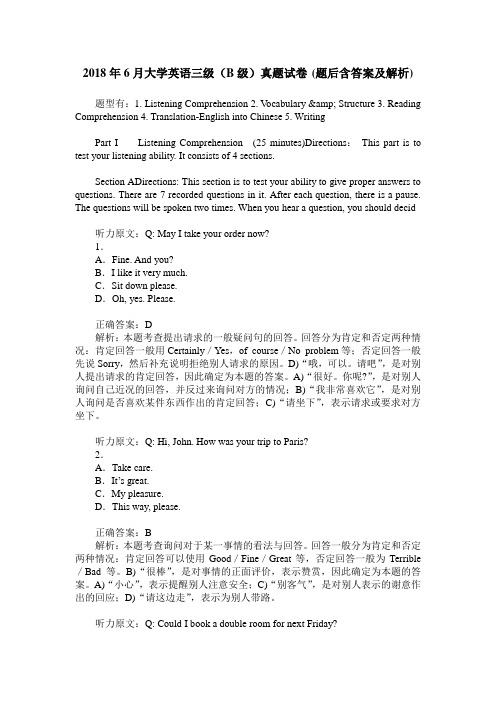
2018年6月大学英语三级(B级)真题试卷(题后含答案及解析)题型有:1. Listening Comprehension 2. V ocabulary & Structure 3. Reading Comprehension 4. Translation-English into Chinese 5. WritingPart I Listening Comprehension (25 minutes)Directions:This part is to test your listening ability. It consists of 4 sections.Section ADirections: This section is to test your ability to give proper answers to questions. There are 7 recorded questions in it. After each question, there is a pause. The questions will be spoken two times. When you hear a question, you should decid听力原文:Q: May I take your order now?1.A.Fine. And you?B.I like it very much.C.Sit down please.D.Oh, yes. Please.正确答案:D解析:本题考查提出请求的一般疑问句的回答。
回答分为肯定和否定两种情况:肯定回答一般用Certainly/Yes,of course/No problem等;否定回答一般先说Sorry,然后补充说明拒绝别人请求的原因。
D)“哦,可以。
请吧”,是对别人提出请求的肯定回答,因此确定为本题的答案。
A)“很好。
2018年广西北部湾经济区中考英语试卷-答案
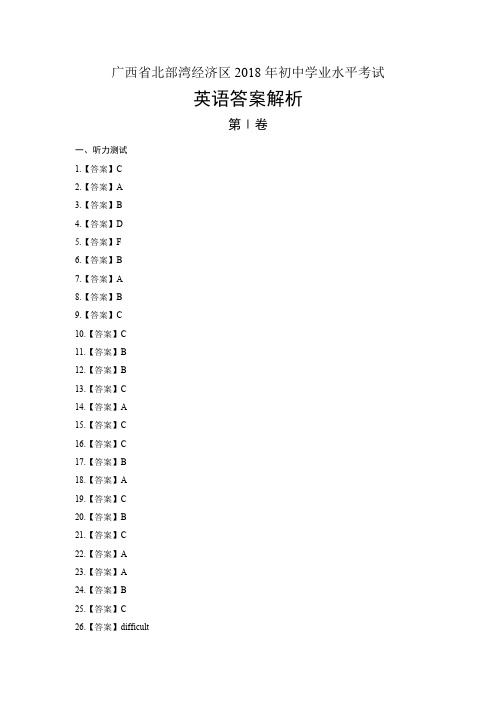
广西省北部湾经济区2018年初中学业水平考试英语答案解析第Ⅰ卷一、听力测试1.【答案】C2.【答案】A3.【答案】B4.【答案】D5.【答案】F6.【答案】B7.【答案】A8.【答案】B9.【答案】C10.【答案】C11.【答案】B12.【答案】B13.【答案】C14.【答案】A15.【答案】C16.【答案】C17.【答案】B18.【答案】A19.【答案】C20.【答案】B21.【答案】C22.【答案】A23.【答案】A24.【答案】B25.【答案】C26.【答案】difficult27.【答案】spelling28.【答案】conversations29.【答案】quickly30.【答案】continues二、单项选择31.【答案】B【解析】句意为:新年快乐!你也是!the same to you意为“您/你也是”,符合句意。
故选B.【考点】情景交际。
32.【答案】D【解析】句意为:我叔叔在一家医院工作。
他是一名医生。
doctor意为“医生”,符合句意。
故选D.【考点】名词辨析。
33.【答案】C【解析】句意为:这些草莓尝起来很美味。
你可以试试。
taste意为“尝起来”,符合句意,故选C.【考点】动词辨析。
34.【答案】D【解析】句意为:Tony学习一直很努力。
在所有的学生中,这次考试他考得最好。
根据句中的"Of all the students"可知,此处应用副词的最高级形式来修饰"did",best是副词well的最高级形式。
故选D.【考点】副词的最高级。
35.【答案】A【解析】句意为:别担心,这个女孩已经足够大来照顾自己了。
根据本句的主语"the girl"和句意可知,此处应用her的反身代词herself作"look after"的宾语。
故选A.【考点】代词辨析。
36.【答案】C【解析】句意为:看这张地图,然后告诉我上海在哪里。
2018年广西梧州市中考英语试卷(含解析)
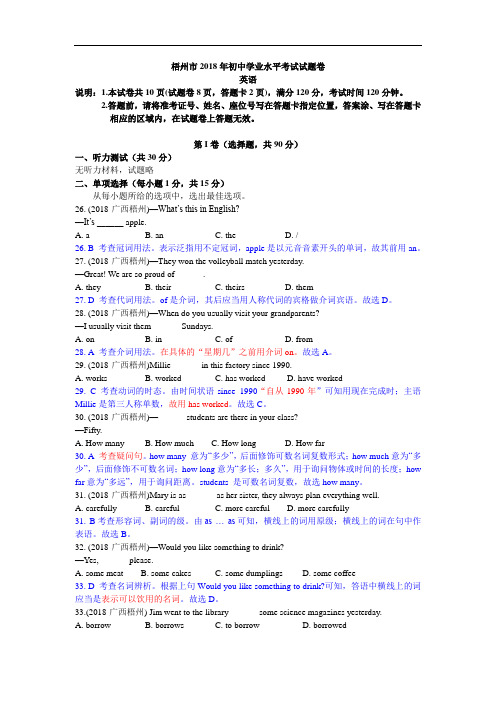
梧州市2018年初中学业水平考试试题卷英语说明:1.本试卷共10页(试题卷8页,答题卡2页),满分120分,考试时间120分钟。
2.答题前,请将准考证号、姓名、座位号写在答题卡指定位置,答案涂、写在答题卡相应的区域内,在试题卷上答题无效。
第I卷(选择题,共90分)一、听力测试(共30分)无听力材料,试题略二、单项选择(每小题1分,共15分)从每小题所给的选项中,选出最佳选项。
26. (2018·广西梧州)—What’s this in English?—It’s ______ apple.A. aB. anC. theD. /26. B 考查冠词用法。
表示泛指用不定冠词,apple是以元音音素开头的单词,故其前用an。
27. (2018·广西梧州)—They won the volleyball match yesterday.—Great! We are so proud of ______.A. theyB. theirC. theirsD. them27. D 考查代词用法。
of是介词,其后应当用人称代词的宾格做介词宾语。
故选D。
28. (2018·广西梧州)—When do you usually visit your grandparents?—I usually visit them ______ Sundays.A. onB. inC. ofD. from28. A 考查介词用法。
在具体的“星期几”之前用介词on。
故选A。
29. (2018·广西梧州)Millie ______ in this factory since 1990.A. worksB. workedC. has workedD. have worked29. C 考查动词的时态。
由时间状语since 1990“自从1990年”可知用现在完成时;主语Millie是第三人称单数,故用has worked。
2018年6月英语四级考试真题试卷附答案(完整版 第1套)
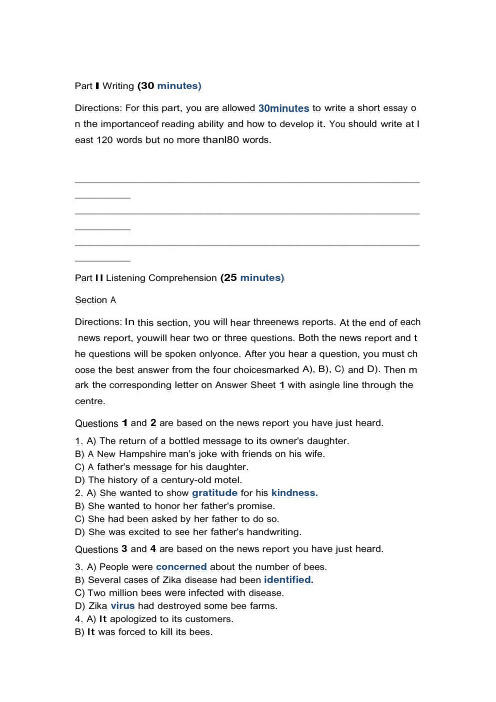
Part I Writing(30minutes)Directions:For this part,you are allowed30minutes to write a short essay o n the importanceof reading ability and how to develop it.You should write at I east120words but no more thanl80words.Part II Listening Comprehension(25minutes)Section ADirections:In this section,you will hear threenews reports.At the end of each news report,youwill hear two or three questions.Both the news report and t he questions will be spoken onlyonce.After you hear a question,you must ch oose the best answer from the four choicesmarked A),B),C)and D).Then m ark the corresponding letter on Answer Sheet1with asingle line through the centre.Questions1and2are based on the news report you have just heard.1.A)The return of a bottled message to its owner's daughter.B)A New Hampshire man's joke with friends on his wife.C)A father's message for his daughter.D)The history of a century-old motel.2.A)She wanted to show gratitude for his kindness.B)She wanted to honor her father's promise.C)She had been asked by her father to do so.D)She was excited to see her father's handwriting.Questions3and4are based on the news report you have just heard.3.A)People were concerned about the number of bees.B)Several cases of Zika disease had been identified.C)Two million bees were infected with disease.D)Zika virus had destroyed some bee farms.4.A)It apologized to its customers.B)It was forced to kill its bees.C)It lost a huge stock of bees.D)It lost2.5million dollars.Questions5to7are based on the news report you have just heard.5.A)It stayed in the air for about two hours.B)It took off and landed on a football field.C)It proved to be of high commercial value.D)It made a series of sharp turns in the sky.6.A)Engineering problems.B)The air pollution it produced.C)Inadequate funding.D)The opposition from the military.7.A)It uses the latest aviation technology.B)It flies faster than a commercial jet.C)It is a safer means of transportation.D)It is more environmentally friendly.Section BDirections:In this section,you will hear two long conversations.At the end of eachconversation,you will hear four questions.Both the conversation and the questions will bespoken only once.After you hear a question,you must c hoose the best answer from the fourchoices marked A),B),C)and D).Then mark the corresponding letter on Answer Sheet Iwith a single line through th e centre.Questions8to11are based on the conversation you have just heard.8.A)It seems a depressing topic.B)It sounds quite alarming.C)It has little impact on our daily life.D)It is getting more serious these days.9.A)The man doesn't understand Spanish.B)The woman doesn't really like dancing.C)They don't want something too noisy.D)They can't make it to the theatre in time.10.A)It would be more fun without Mr.Whitehead hosting.B)It has too many acts to hold the audience's attention.C)It is the most amusing show he has ever watched.D)It is a show inappropriate for a night of charity.11.A)Watch a comedy.B)Go and see the dance.Then how to improve our reading skills?First of all,scan the material before we begin.Whatever the purpose of our reading is,take a few minutes to look the piece over to checkand see how the work is structured and presented.S econdly,try not to reach for thedictionary when we come to a word we don't know.Instead,try to guess the meaning of theword based on the context.L ast but not least,write a few sentences to summarize whatwe've read since it is a way of checking that we understand what we're reading.Above all,reading has important benefits and can help us learn the language faster and morecompletely,which encourages each language learner to devel op their reading skills assuggested.Part II Listening Comprehension1.A)The return of a bottled message to its owner's daughter.2.B)She wanted to honor her father's promise.3.B)Several cases of Zika disease had been identified.4.C)It lost a huge stock of bees.5.A)It stayed in the air for about two hours.6.C)Inadequate funding.7.D)It is more environmentally friendly.8.A)It seems a depressing topic.9.D)They can't make it to the theatre in time.10.C)It is the most amusing show he has ever watched.11.B)Go and see the dance.12.D)She worries she won't fit in as a transfer student.13.C)Participate in after-school activities.14.A)Give her help whenever she needs it.15.D)She has just transferred to the college.16.B)To find out which physical drive is the most powerful.17.A)When they are hungry.18.C)They prefer to be with other mice.19.D)It is one of the best in the world.20.B)To move troops quickly from place to place.21.A)In the1970s.22.B)Messaging while driving.23.D)A device to ensure people drive with both hands.24.C)They are alerted with a light and a sound.25.B)Using a connected app.Part III Reading Comprehension26-35:EOFCN IKLAJ36-45:KDMGB LHFJC46-55:ACACD BADDBPart IV TranslationIn the past,traveling by plane was unimaginable for most Chinese people.To day,with thedevelopment of China's economy and the improvement of peop Ie's living standards,moreand more Chinese people,including many farmers and migrant workers,can travel by air.They can fly to all major cities,and ma ny other cities are also planning to build airports.Airservices continue to impr ove,and there are often cheap flights.In recent years,the numberof people c hoosing to travel by air during holidays has been increasing.。
2018广西梧州中考英语解析

梧州市2018年初中学业水平考试试题卷英语说明:1.本试卷共10页(试题卷8页,答题卡2页),满分120分,考试时间120分钟。
2.答题前,请将准考证号、姓名、座位号写在答题卡指定位置,答案涂、写在答题卡相应的区域内,在试题卷上答题无效。
第I卷(选择题,共90分)一、听力测试(共30分)无听力材料,试题略二、单项选择(每小题1分,共15分)从每小题所给的选项中,选出最佳选项。
26. (2018·广西梧州)—What’s this in English?—It’s ______ apple.A. aB. anC. theD. /26. B 考查冠词用法。
表示泛指用不定冠词,apple是以元音音素开头的单词,故其前用an。
27. (2018·广西梧州)—They won the volleyball match yesterday.—Great! We are so proud of ______.A. theyB. theirC. theirsD. them27. D 考查代词用法。
of是介词,其后应当用人称代词的宾格做介词宾语。
故选D。
28. (2018·广西梧州)—When do you usually visit your grandparents?—I usually visit them ______ Sundays.A. onB. inC. ofD. from28. A 考查介词用法。
在具体的“星期几”之前用介词on。
故选A。
29. (2018·广西梧州)Millie ______ in this factory since 1990.A. worksB. workedC. has workedD. have worked29. C 考查动词的时态。
由时间状语since 1990“自从1990年”可知用现在完成时;主语Millie是第三人称单数,故用has worked。
2018-2019年广西英语高二水平会考真题及答案
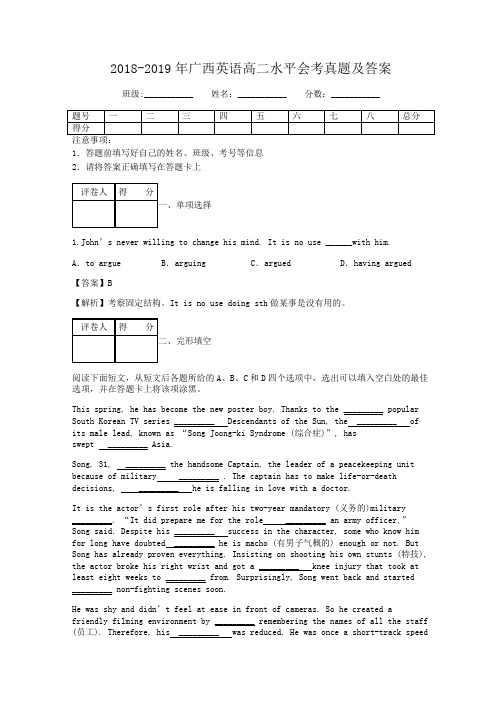
2018-2019年广西英语高二水平会考真题及答案班级:___________ 姓名:___________ 分数:___________1.答题前填写好自己的姓名、班级、考号等信息2.请将答案正确填写在答题卡上1.John’s never willing to change his mind. It is no use ______with him.A.to argue B.arguing C.argued D.having argued【答案】B【解析】考察固定结构。
It is no use doing sth做某事是没有用的。
阅读下面短文,从短文后各题所给的A、B、C和D四个选项中,选出可以填入空白处的最佳选项,并在答题卡上将该项涂黑。
This spring, he has become the new poster boy. Thanks to the _________ popular South Korean TV series _________ Descendants of the Sun, the _________ of its male lead, known as “Song Joong-ki Syndrome (综合症)”, hasswept _________ Asia.Song, 31, _________ the handsome Captain, the leader of a peacekeeping unit because of military _________ . The captain has to make life-or-death decisions, _________ he is falling in love with a doctor.It is the actor’s first role after his two-year mandatory (义务的)military_________. “It did prepare me for the role _________ an army officer,”Song said. Despite his _________ success in the character, some who know him for long have doubted _________ he is macho (有男子气概的) enough or not. But Song has already proven everything. Insisting on shooting his own stunts (特技), the actor broke his right wrist and got a _________ knee injury that took at least eight weeks to _________ from. Surprisingly, Song went back and started_________ non-fighting scenes soon.He was shy and didn’t feel at ease in front of cameras. So he created afriendly filming environment by _________ remembering the names of all the staff (员工). Therefore, his _________ was reduced. He was once a short-track speedskater. Unfortunately, a serious injury _________ Song to give up his dream of being a /an_________ athlete.Like his skater dream ended in failure, many stars can’t escape their_________ popularity. “If now is the peak of my career, I must find something else and climb to the peak again,” he told the website. “I want to be an actor who can quickly_________ his feet after a fall.”2.A.wildly B.widely C.specially D.simply3.A.naming B.being named C.named D.having named4.A.admiration B.support C.Popularity D.respect5.A.through B.over C.on D.across6.A.performs B.experiences C.plays D.develop7.A.conflicts B.work C.action D.movement8.A.even then B.as if C.even though D.as though9.A.service B.guidance C.order D.fighting10.A.like B.as C.for D.with11.A.current B.constant C.tight D.earlier12.A.that B.if C.whether D.why13.A.sour B.mild C.severe D.wild14.A.recover B.suffer C.tolerate D.protect15.A.shooting B.playing C.acting D.showing16.A.surprisingly B.delightedly C.eagerly D.deliberately17.A.anxiety B.fear C.pessimism D.confusion18.A.refused B.made C.forced D.let19.A.amateur B.senior C.educational D.professional20.A.Falling B.failing C.fading D.flying21.A.get along with B.get back on C.get close to D.get down to 【答案】2.A3.C4.C5.D6.C7.A8.C9.A10.B11.A12.C13.C14.A15.A16.D17.A18.C19.D20.C21.B【解析】试题分析:本文介绍了一个因出演了韩剧“太阳的后裔”而被观众了解,当前非常受欢迎的韩剧演员-宋仲基。
2018年广西北部湾中考英语试卷(含解析)

2018年广西北部湾经济区初中学业水平统一考试英语(2018·广西北部湾)二、单项选择(10小题,每小题1分,共10分)从下面每小题所给的A、B、C、D个选项中,选出可以填入空白处的最佳选项,并在答卡上将选定答案的字母标号涂黑(2018·广西北部湾)31.--Happy New Year !-- .A. That's OKB. The same to youC. It doesn’t matterD. You're welcome.31. B 考查情景交际。
句意:Happy New Year!新年快乐!选项:That's OK. 没关系。
It doesn’t matter没关系。
You're welcome.别客气。
只有The same to you.彼此彼此,同乐同乐!符合题意,故答案选B。
(2018·广西北部湾)32. My uncle works in a hospital. He is a/an .A. singerB. farmerC. actorD. doctor32. D 考查名词词义辨析。
My uncle works in a hospital. 我的叔叔在医院工作。
由此可以推测我的叔叔应该是一位医生,故答案选D。
(2018·广西北部湾)33. The strawberries delicious. You can have a try.A. eatB. drinkC. tasteD. sound33. C 考查动词词义辨析。
eat吃,drink喝,sound听起来,taste尝起来。
分析句意:这些草莓______美味,只有尝起来符合题意,故选C。
(2018·广西北部湾)34. Tony always works hard. Of all the students, he did in this exam.A. goodB. well C better D. best34. D 考查副词的比较等级。
2018年6月广西壮族自治区普通高中学业水平考试参考答案与评分细则

2018 年 6 月广西壮族自治区普通高中学业水平考试思想政治参考答案及评分细则一、单项选择题(本大题共35 小题,每小题 2 分,共 70分)题号123456789101112131415161718答案DABCADCABDABDCBADC题号1920212223242526272829303132333435答案BADBCDACBDACDABCB二、非选择题(本大题共 3 小题,共 30 分)36.衬衣标价 165 元是货币执行价值尺度职能(2分),衬衣以158元成交是货币执行流通手段职能(2 分)。
【评分细则】①答出价值尺度(职能)和流通手段(职能)且前后顺序正确或序列号正确,给 4 分;顺序颠倒给 1 分;只答价值尺度(职能)、流通手段(职能)其中一个职能,给 2 分。
②罗列两种以上的货币职能,前两个是价值尺度(职能)、流通手段(职能),且顺序正确的给 3 分,其他答法最多能给 1 分。
不含价值尺度(职能)、流通手段(职能)的不给分。
③职能名称表述必须准确,如价值职能、尺度职能、价格尺度、流通职能等不给分。
37.(1)实施创新驱动发展战略,提高农业劳动生产率,推进科技强农;推动特色优势产业升级,优化农村产业结构,促进乡村产业振兴;推动城乡发展一体化,促进城乡区域协调发展,加快形成新型工农城乡关系;加强乡村生态环境保护,推进生态乡村建设,促进广西乡村振兴。
评分说明:不写材料只答观点,每答对 1 个观点给 1 分,最多给 3 分;不答观点只正确写出材料, 1 个材料给 1 分,最多给 3 分;每答对 1 个观点并写出与观点一致的材料给 2 分,最多给 6 分;若将“推动特色优势产业升级,优化农村产业结构” 答成“推进经济结构战略性调整” ,或将“加强乡村生态环境保护”答成“全面促进资源节约和环境保护”,也可对应给分。
本小题满分 6 分。
【评分细则】①实施创新驱动发展战略(或树立创新思维、或明确创新发展方向、或加强新技术的研发应用),提高农业劳动生产率,推进科技强农。
- 1、下载文档前请自行甄别文档内容的完整性,平台不提供额外的编辑、内容补充、找答案等附加服务。
- 2、"仅部分预览"的文档,不可在线预览部分如存在完整性等问题,可反馈申请退款(可完整预览的文档不适用该条件!)。
- 3、如文档侵犯您的权益,请联系客服反馈,我们会尽快为您处理(人工客服工作时间:9:00-18:30)。
高二英语期考试题/2018年6月广西壮族自治区普通高中学业水平考试英语(全卷满分100分,考试时间120分钟)注意事项:1.答题前,考生务必将姓名、座位号、考籍号填写在答题卡上。
2.考生作答时,请在答题卡上作答(答题注意事项见答题卡),在本试题上作答无效。
3.先考听力理解,在听力理解开始前有两分钟听力试音时间。
第I卷第一部分听力理解(共两节,满分20分。
温馨提示:请在答题卡上作答,在本试题上作答无效。
)第一节(共5小题;每小题1分,满分5分)听下面5段对话,每段对话后有一个小题,从题中所给的A、B、C三个选项中选出最佳选项,并在答题卡上的相应位置将该项涂黑。
听完每段对话后,你都有10秒钟的时间来回答有关小题和阅读下一小题。
每段对话读两遍。
1.What does the man usually do in his free time?A.Watch TV. B.Go shopping. C.Do sports.2.What does the woman want?A.A ruler. B.A pen. C.A bike.3.Who is Tom going to see this Saturday?A.His aunt. B.His sister. C.His grandma.4.What is Jack’s dad doing?A.Drawing. B.Reading. C.Calling.5.How is the weather today?A.Rainy. B.Windy. C.Sunny.第二节(共15小题;每小题1分,满分15分)听下面5段对话或独白,每段对话或独白后有几个小题,从题中所给的A、B、C三个选项中选出最佳选项,并在答题卡上的相应位置将该项涂黑。
听每段对话或独白前,你将有时间阅读各小题,每小题5秒钟;听完后,各小题将给出5秒钟的作答时间。
每段对话或独白读两遍。
听第6段材料,回答第6~7小题。
6.What is Mr. Smith doing in Guangzhou now?A.Visiting a friend. B.Seeing a doctor. C.Attending a meeting. 7.When will Mr. Smith come back?A.Today. B.Tomorrow. C.Next week.听第7段材料,回答第8~9小题。
8.What’s wrong with the woman?A.She has a cold. B.She has a fever. C.She has a headache.9.How long has the woman been coughing?A.Two days. B.Three days. C.Four days.听第8段材料,回答第10~12小题。
10.What are the two speakers talking about?A.Chinese tea culture. B.Chinese paper cutting.C.The Dragon Boat Festival.11.Why do the Chinese people celebrate the festival?A.In honor of Qu Yuan. B.In honor of Li Bai.C.In honor of Du Fu.12.What special activity do the Chinese people have during the festival?A.Ball games. B.Dragon boat races.C.Folk song competitions.听第9段材料,回答第13~15小题。
13.What did the man think of the trip to the farm?A.Terrible.B.Boring.C.Great.14.How did the man go to the farm with his family?A.By car. B.By bus.C.By train.15.What kind of fruit did they pick?A.Apples.B.Oranges.C.Strawberries.听第10段材料,回答第16~20小题。
16.When will Mr. Green make the speech?A.Next Monday. B.Next Tuesday. C.Next Wednesday. 17.What is Mr. Green’s speech about?A.School life.B.Healthy eating.C.Table manners. 18.Where is Mr. Green from?A.Canada. B.England. C.Italy.19.In what language will Mr. Green make the speech?A.In English. B.In French. C.In Japanese.20.What should the students do if they want to attend the speech?A.Make phone calls. B.Pay some money. C.Write down their names.第二部分英语知识运用(共两节,满分25分。
温馨提示:请在答题卡上作答,在本试题上作答无效。
)第一节单项选择(共10小题;每小题1分,满分10分)从下面各题所给的A、B、C、D四个选项中,选出可以填入空白处的最佳选项, 并在答题卡上的相应位置将该项涂黑。
21.— Do you like playing football, Mike?— No, I don’t. But I like playing basketball.A.a B.an C.the D./22.— Wow! You look beautiful in your new dress, Lisa.— .A.Thank you B.Of course notC.It doesn’t matter D.Sorry to hear that23.— What’s your favorite ?— Apples. An apple a day keeps the doctor away.A.drink B.fruit C.meat D.bread24.— Whose dog is this?— It’s dog.A.I B.me C.my D.mine25.— Look! Is that Peter?— No, it’s Jack. Peter is than Jack.A.tall B.taller C.tallest D.the tallest 26.— Who is in the classroom?— David. He his homework now.A.does B.did C.is doing D.was doing 27.— Do you like English?— Yes, I do. And I’m good it.A.for B.in C.on D.at28.My mother is ill. I have to her at home.A.look for B.look out C.look up D.look after 29.Miss Gao is a music teacher and she enjoys to music.A.listen B.listening C.listened D.to listen30.— Do you know the man is talking with our math teacher?— Yes. He is our new headmaster, Mr. Brown.A.who B.whom C.whose D.which第二节完形填空(共10小题;每小题分,满分15分)阅读下面短文,从短文后各题所给的A、B、C、D四个选项中,选出可以填入空白处的最佳选项,并在答题卡上的相应位置将该项涂黑。
When I was in middle school, my father went to my school and drove me home every Friday afternoon. On the way home, we usually talked and laughed. How happywe were!One day, my 31 was driving me home as usual. But to my surprise,he didn’t say a word 32 the way home. It seemed that he was not very well. “Are you sick, Dad?” I asked him. “No, dear. Don’t worry,” he answered.Later at home, I found my father smoking in the balcony (阳台). And I knewhe had stopped 33 many years before. Something must be wrong with him.So I went to my mother and told her about my worries. My mother 34 methat my father had been out of work for several days, and he hadn’t got a new 35 yet. Hearing this, I felt sorry and 36 . Whenever I had37 , my father always encouraged me. The next day, I made a card for my father.I wrote some words on it to 38 him. My father was moved to tears. He hugged me and said, “Thank you, dear. Everything will be fine soon.”Our parents always take good care of us, 39 some of us never think about them. How selfish we are! As teenagers, we should not only care about ourselves, but also40 our parents and other people.31.A.mother B.sister C.father D.brother32.A.on B.at C.to D.off33.A.cleaning B.watering C.drinking D.smoking 34.A.asked B.gave C.told D.sent35.A.car B.job C.house D.school 36.A.happy B.sad C.excited D.lucky 37.A.spirit B.truth C.trouble D.belief 38.A.punish B.complain C.promise D.encourage 39.A.but B.so C.or D.for40.A.care about B.look over C.believe in D.pick up第三部分阅读理解(共两节,满分30分。
